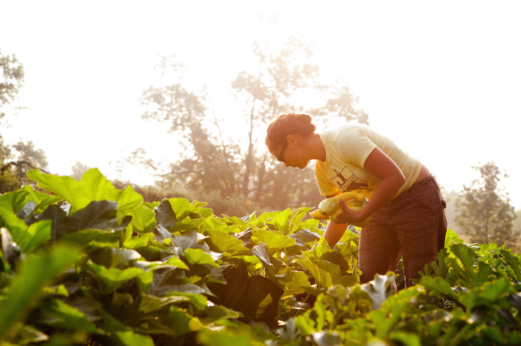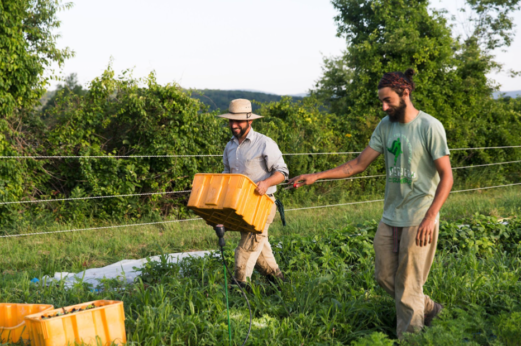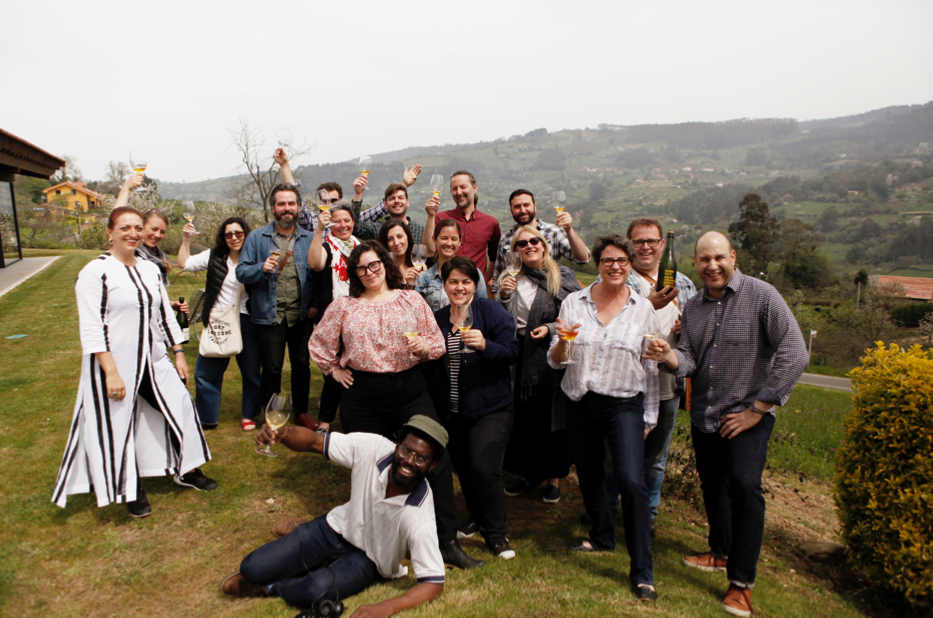How Do We Forge a Nationally Linked Regional Food System?
Glynwood shows us the way.
In 2010, the nonprofit organization Glynwood, based in Cold Spring, New York, launched Cider Week New York City. At the time, there was only a handful of hard cider makers in the state — the drink was a half-forgotten throwback to a bygone era. The idea was to create a new market based on this added-value farm product by connecting cider producers with the “gatekeeper community” of wine and spirits professionals, beverage directors and bartenders in the city. They, in turn, would introduce consumers to this novel product.
Over the next 10 years, cider took off, with the number of producers in the state mushrooming from five in 2011 to more than 90 today, the majority of which are farm based. “Cider awareness and consumption have reached critical mass,” says Jenn Smith, executive director of the New York Cider Association, which Glynwood cofounded in 2015. “There’s a new crop of 21-year-olds every year who are looking for sustainability, traceability, regionality and lower alcohol levels in their beverages.” Cider Week has become a fixture in three other regions of the state as well: Hudson Valley, Finger Lakes and Western New York.
Creating new economies for local farm products is just one example of how Glynwood has emerged over the past decade as a prime catalyst for food system change in the Hudson Valley. In addition to regional food programs, its 225-acre property is a lab for regenerative livestock ranching and vegetable farming practices, a farm apprenticeship program, a farm business incubator, community-supported agriculture (CSA) and farm dinners, tours and workshops for the public. Glynwood was established in 1996, after the property’s conservation-minded owner, Linn Perkins, passed away and the family dedicated the property to conservation. More than 1,700 acres of the family’s forested uplands became part of Fahnestock State Park, which surrounds Glynwood.

“I think of Glynwood as a boots-on-the-ground center for regional food and farming, making the case that regional is the appropriate scale for regenerative, sustainable agriculture,” says Glynwood president Kathleen Finlay, whom many credit with the organization’s emergence as a leader in building a robust regional foodshed. She sees Glynwood as part of a nationwide movement to resurrect regional food systems — the way Vermont’s state government has committed to funding a statewide, equal-access farming and food system and pockets of Wisconsin and northern California are engaged in similar efforts.
Thanks to the work of organizations like Glynwood, these disparate regional food networks are becoming more and more interconnected. Over the past three years, Glynwood has collaborated with the FairShare CSA Coalition, based in Madison, Wisconsin. By sharing a U.S. Department of Agriculture grant with CSA organizations that span the country from Oregon to California to New York, FairShare is working to establish an online communication platform that will give members access to resources, research studies, training manuals and podcasts. “We will also offer sharing between novice and experienced farmers and technical assistance providers,” says Carrie Sedlak, executive director of FairShare.
Glynwood is well positioned to advance a regional foodshed and link to nationwide networks because of its Hudson Valley location, where a strong local food system is powered by engaged producers and eaters, says Sedlak. The organization’s experienced staff and model farmer training programs lend added muscle to achieve “the end goal of a strong regional and national food system where consumers can understand how their food is produced and make informed decisions about the food they purchase and the impact they have on the environment, the economy and small-farm vitality,” says Sedlak. In its own foodshed, Glynwood has organized a network of 85 CSA farms in 10 New York counties.
Coalition building is just one of Glynwood’s three main areas of activity, says Finlay, who arrived at Glynwood in 2012 after serving as the director of the Center for Health and the Global Environment at Harvard University. The other two are training an agricultural workforce and empowering change makers outside of food and farming. Recently, the organization hosted a three-day gathering of physicians. The goal was to demonstrate the importance of a regionally based diet that the doctors could promote through healthy local food delivery prescriptions or the state’s Double Up Food Bucks plan, which helps patients who are eligible for Supplemental Nutrition Assistance Program (SNAP) benefits access local farmers’ markets and CSAs. “By learning about regional food and how it works, these doctors can help move it forward,” says Finlay.

Glynwood’s latest project is the Hudson Valley Farmer Training Collaborative, a one-year pilot project backed by $165,000 in foundation money. One of Glynwood’s most recent hires, senior farm director Lynda Prim, will oversee the program. By bringing together five leading organizations that train new farmers under one umbrella, Finlay hopes to connect more than a dozen similar regional organizations throughout the northeast. Joint apprentice recruitment, cooperative workshops, joint alumni tracking and qualitative research are among the programs explored by the collaborative. “The organization is putting power in the hands of agriculturists,” Prim points out, “and that’s not happening everywhere in the nonprofit world.”
Steffen Schneider, director of farming operations at member farm Hawthorne Valley in Ghent, New York, says that by applying for, administering and dividing its grant money among five member farms instead of each farm competing for the same funds, Glynwood is “giving us a much better chance of success.” Hawthorne Valley’s role will be to lead research into weaknesses in current farmer training and barriers to young farmer success.
Finlay is also adept at spotting holes in the food system and addressing them, says Schneider. Glynwood’s farm business incubator program grew out of an awareness that new farmer training programs in the region were launching farmers who often found their first years in business a struggle, he notes. “If you can’t get young farmers to be successful at their craft, everything else is pointless,” he says. Glynwood’s incubator program enables farmers in the crucial early years of their businesses to get key support in all areas of operation, including business and financial planning, marketing strategy and farm systems technical assistance.
“All of this is really hard work,” says Finlay, “and the change, especially the coalition building — which perhaps has the most impact — takes a lot of time and finesse. There’s no quick fix. The hardest part is simply bringing people together — whether it’s peers working in the same sector, farmers gathered around a table or new farmers trying to run a business — and building that sense of community that a regional food system demands.” But, she adds, “I see progress and an energy level. People are talking about a regional food system in a way I didn’t see six years ago. It’s poco a poco, bit by bit. The change is generational.”
Follow us
This work is licensed under a Creative Commons Attribution-NoDerivatives 4.0 International License.
Want to republish a Modern Farmer story?
We are happy for Modern Farmer stories to be shared, and encourage you to republish our articles for your audience. When doing so, we ask that you follow these guidelines:
Please credit us and our writers
For the author byline, please use “Author Name, Modern Farmer.” At the top of our stories, if on the web, please include this text and link: “This story was originally published by Modern Farmer.”
Please make sure to include a link back to either our home page or the article URL.
At the bottom of the story, please include the following text:
“Modern Farmer is a nonprofit initiative dedicated to raising awareness and catalyzing action at the intersection of food, agriculture, and society. Read more at <link>Modern Farmer</link>.”
Use our widget
We’d like to be able to track our stories, so we ask that if you republish our content, you do so using our widget (located on the left hand side of the article). The HTML code has a built-in tracker that tells us the data and domain where the story was published, as well as view counts.
Check the image requirements
It’s your responsibility to confirm you're licensed to republish images in our articles. Some images, such as those from commercial providers, don't allow their images to be republished without permission or payment. Copyright terms are generally listed in the image caption and attribution. You are welcome to omit our images or substitute with your own. Charts and interactive graphics follow the same rules.
Don’t change too much. Or, ask us first.
Articles must be republished in their entirety. It’s okay to change references to time (“today” to “yesterday”) or location (“Iowa City, IA” to “here”). But please keep everything else the same.
If you feel strongly that a more material edit needs to be made, get in touch with us at [email protected]. We’re happy to discuss it with the original author, but we must have prior approval for changes before publication.
Special cases
Extracts. You may run the first few lines or paragraphs of the article and then say: “Read the full article at Modern Farmer” with a link back to the original article.
Quotes. You may quote authors provided you include a link back to the article URL.
Translations. These require writer approval. To inquire about translation of a Modern Farmer article, contact us at [email protected]
Signed consent / copyright release forms. These are not required, provided you are following these guidelines.
Print. Articles can be republished in print under these same rules, with the exception that you do not need to include the links.
Tag us
When sharing the story on social media, please tag us using the following: - Twitter (@ModFarm) - Facebook (@ModernFarmerMedia) - Instagram (@modfarm)
Use our content respectfully
Modern Farmer is a nonprofit and as such we share our content for free and in good faith in order to reach new audiences. Respectfully,
No selling ads against our stories. It’s okay to put our stories on pages with ads.
Don’t republish our material wholesale, or automatically; you need to select stories to be republished individually.
You have no rights to sell, license, syndicate, or otherwise represent yourself as the authorized owner of our material to any third parties. This means that you cannot actively publish or submit our work for syndication to third party platforms or apps like Apple News or Google News. We understand that publishers cannot fully control when certain third parties automatically summarize or crawl content from publishers’ own sites.
Keep in touch
We want to hear from you if you love Modern Farmer content, have a collaboration idea, or anything else to share. As a nonprofit outlet, we work in service of our community and are always open to comments, feedback, and ideas. Contact us at [email protected].by Nancy Matsumoto, Modern Farmer
May 6, 2019
Modern Farmer Weekly
Solutions Hub
Innovations, ideas and inspiration. Actionable solutions for a resilient food system.
ExploreExplore other topics
Share With Us
We want to hear from Modern Farmer readers who have thoughtful commentary, actionable solutions, or helpful ideas to share.
SubmitNecessary cookies are absolutely essential for the website to function properly. This category only includes cookies that ensures basic functionalities and security features of the website. These cookies do not store any personal information.
Any cookies that may not be particularly necessary for the website to function and are used specifically to collect user personal data via analytics, ads, other embedded contents are termed as non-necessary cookies.
